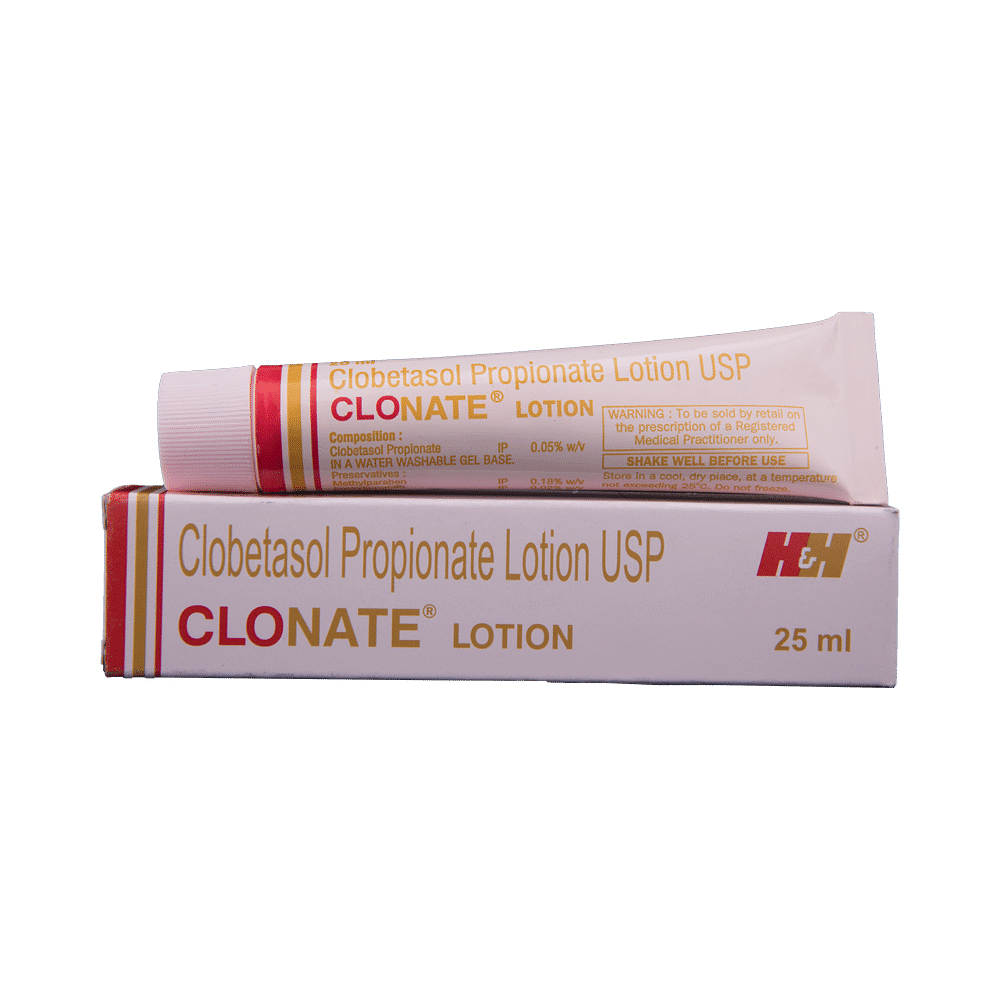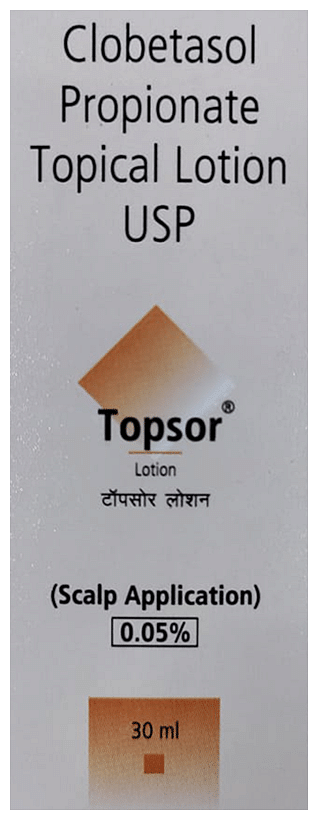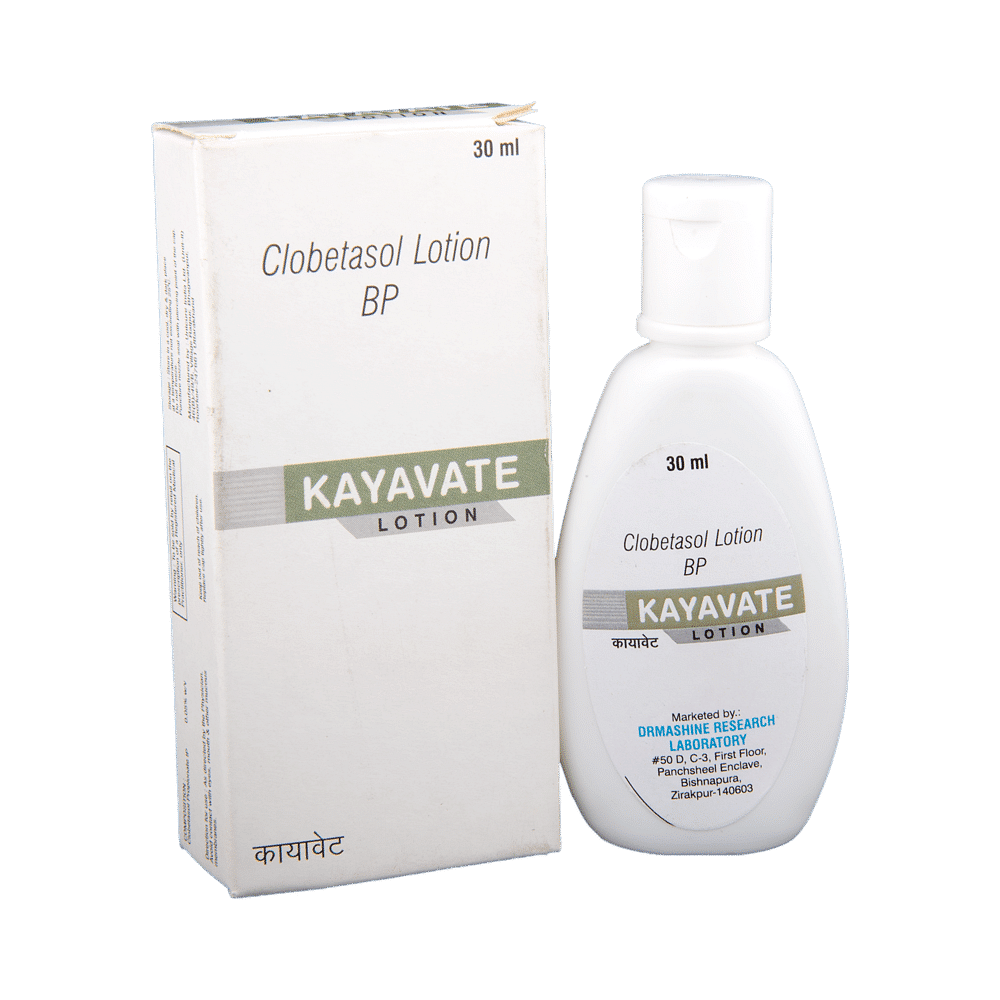
Clobezine 0.05% Lotion
Manufacturer
Avancer Labs Pvt Ltd
Salt Composition
Clobetasol (0.05% w/v)
Key Information
Short Description
Clobezine 0.05% Lotion is a steroid used to treat various skin conditions such as dermatitis, eczema, and allergies, reducing swelling, redness, and itchiness of the skin.
Dosage Form
Lotion
Introduction
Clobezine 0.05% Lotion belongs to a group of medicines called steroids. It is used to treat various skin conditions such as dermatitis, eczema, and allergies. It works by reducing swelling, redness, and itchiness of the skin and prevents further irritation.
Directions for Use
This medicine is for external use only. Use this medicine in the dose and duration as advised by your doctor. Shake it well and apply to the area evenly.
How it works
Clobezine 0.05% Lotion is a steroid. It works by blocking the production of certain chemical messengers that make the skin red, swollen, and itchy.
Quick Tips
Don't use it more often or for longer than advised by your doctor. Don't cover the area being treated with airtight dressings such as bandages unless directed by a doctor as this may increase the risk of side effects. If you think the area of skin you are treating has become infected you should stop using Clobezine 0.05% Lotion and consult your doctor. Consult your doctor if your skin condition has not improved after four weeks of treatment. Do not use it for more than 4 consecutive weeks at a time.
Related Medicines

Clonate Lotion

Topsor 0.05% Solution

Topsor Lotion

Clopex Lotion

K-Vate 0.05% Lotion

Kayavate Lotion

Topclo 0.05% Lotion

Closol Lotion

Clobzit 0.05% Lotion

Dermaquit Lotion
Frequently asked questions
Can Clobezine 0.05% Lotion be used for a long time?
No, Clobezine 0.05% Lotion should not be used for a long time. The doctor generally prescribes it for two consecutive weeks only. However, treatment may be extended for chronic (long-term) inflammatory conditions. Consult your physician before using this medication.
Does Clobezine 0.05% Lotion cause severe skin reactions?
Severe skin reactions are rare with Clobezine 0.05% Lotion. It's an anti-inflammatory drug used for treating skin diseases, skin reactions, and eczemas. However, skin reactions can occur in people hypersensitive to Clobezine 0.05% Lotion. Leaving the affected area open after application is important as occlusive dressings (air- and water-tight dressings) may lead to skin reactions. The medicine itself might not cause a reaction but added excipients with medication may cause a reaction in some cases. Inform your doctor immediately if you experience any skin reactions.
Can Clobezine 0.05% Lotion be used on the face?
No, Clobezine 0.05% Lotion should not be used on the face. Additionally, it shouldn't be used in armpits (axillae), groin, or if there is atrophy (tissue wasting) at the treatment site. In rare circumstances, it might be considered by doctors, but only after consultation with your physician and limiting application to a maximum of 5 days.
Can Clobezine 0.05% Lotion be used on children?
Clobezine 0.05% Lotion is not recommended for use in children under one year of age. It's also not recommended for older children and adolescents, as side effects are more common in these groups. In the pediatric population, there is an increased risk of immune system suppression which may make them more prone to other diseases and skin atrophy. Therefore, it is not recommended. However, in rare cases, a doctor might prescribe it, but treatment is usually limited to 5 days and reviewed weekly.
Can we use Clobezine 0.05% Lotion in infections?
Clobezine 0.05% Lotion is not an antimicrobial or antifungal medication. It's a corticosteroid, which suppresses the immune system and increases the risk of infections. Bacterial infections are more likely to worsen if treated with Clobezine 0.05% Lotion after an infection develops. If your inflammatory lesions become infected or experience any spread of infection, consult your doctor immediately. Your doctor will withdraw Clobezine 0.05% Lotion and provide appropriate antimicrobial therapy.
Can I stop taking Clobezine 0.05% Lotion when my symptoms are relieved?
No, do not stop taking Clobezine 0.05% Lotion even if you feel better. It's important to finish the entire course of treatment as your symptoms may improve before completing it. Stopping Clobezine 0.05% Lotion before finishing your medication might bring back your symptoms.
Does Clobezine 0.05% Lotion cause dangerous skin reactions?
Local skin reactions are rare with Clobezine 0.05% Lotion. It's an anti-inflammatory drug used for treating skin diseases, skin reactions, and eczemas. However, skin reactions can occur in people hypersensitive to Clobezine 0.05% Lotion. Leaving the affected area open after application is important as occlusive dressings (air- and water-tight dressings) may lead to skin reactions. If not by the medicine itself, sometimes the reactions are caused by added excipients with the medications. Inform your doctor immediately if you experience any skin reactions.


